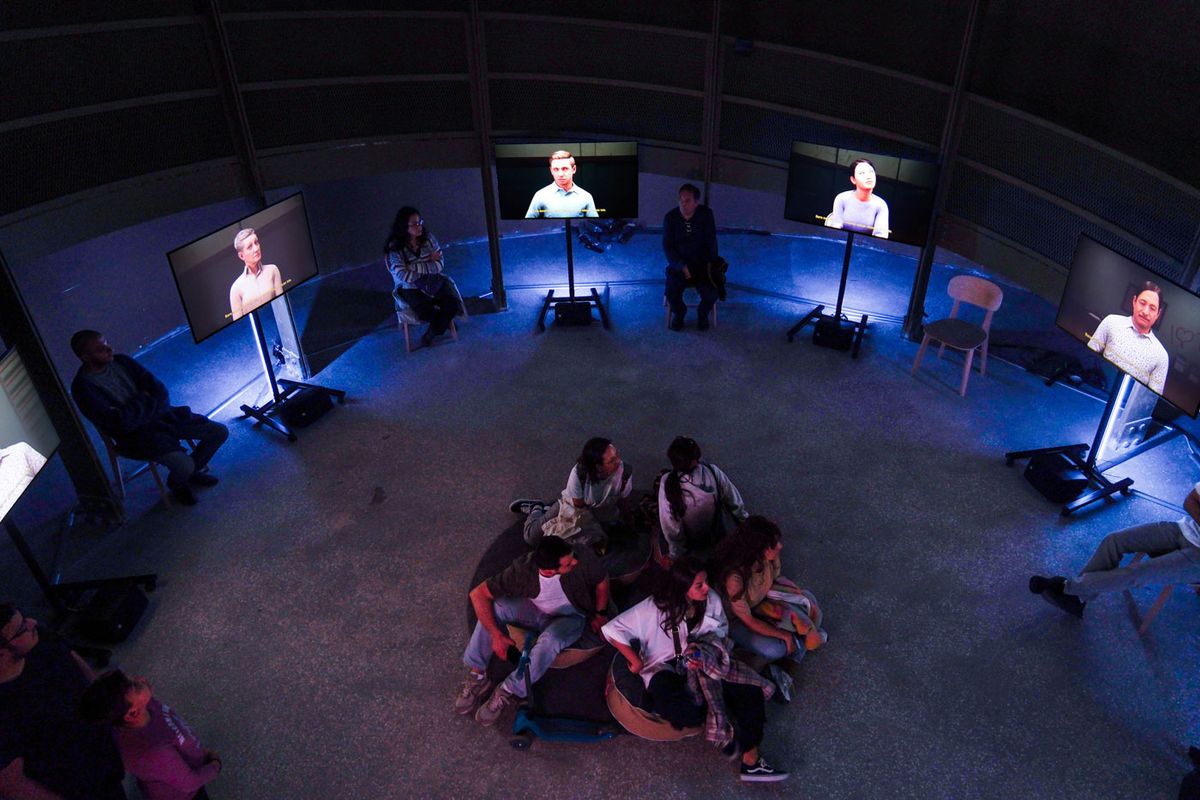Theresa Reiwer, a German-born artist whose work concerns artificial intelligence (AI) and ethics, has won the top award offered by the Lumen Prize, the world’s leading prize for art created with technology. Reiwer received the Gold Award for Decoding Bias, an immersive, 360-degree film installation, at the 13th annual Lumen awards, at Kachette, in Shoreditch, east London, on 9 October.
This year's winners were honoured in nine categories chosen from a pool of 65 finalists selected from nearly 2,000 entries from 62 countries. "The 2024 Lumen Prize winners exemplify the innovative spirit and technical mastery that define the intersection of art and technology," said Gillian Varney, director of the Lumen Prize. The 65-strong selection panel for the prize came from institutions such as Sotheby’s, the Royal College of Art, Google, Tezos and Gucci. The winners were later chosen by a jury panel of individuals drawn from institutions including the Whitney Museum of American Art, the Victoria and Albert Museum (V&A), M+ Hong Kong and HEK (House of Electronic Arts).
This is the first year that the awards have featured a Carla Rapoport Award to honour the award’s founder, who introduced the evening and gave the first award in her name to UchanSun, a previous winner of the Lumen Prize students’ award.
In the past 12 years, the Lumen Prize has honoured more than 140 leaders in the technology-based arts, including Refik Anadol, Mario Klingemann, Operator and Casey Reas. This year’s Lumen entries were notable for their international range, and discussion on the evening of the awards ceremony touched on the historic importance of both Los Angeles and London in the 1960s as starting bases for the popularisation of digital arts in the transistor age and afterwards.
Next year’s awards will be supported by the proceeds of a Sotheby’s online auction, which runs until 16 October, curated by Auronda Scalera and Alfredo Cramerotti, offering lots donated by previous winners of Lumen Prize awards, including Sougwen Chung, Botto, 0xhaiku, Sahsa Stiles and Fahad Karim.
The Awards
Gold Award: for exceptional work across all categories
Theresa Reiwer: Decoding Bias
Reiwer’s Decoding Bias, an immersive film installation, places its viewers at the centre of a circle of eight human-like embodied AI avatars who are engaged in a self-governed group therapy session. The sense of transition between the real and the virtual is enhanced by having the viewers sit in the same type of chair as the surrounding AI figures. The AI participants aim to eliminate discriminatory algorithms, but do not always agree and find themselves victims of their flawed, human-made datasets.
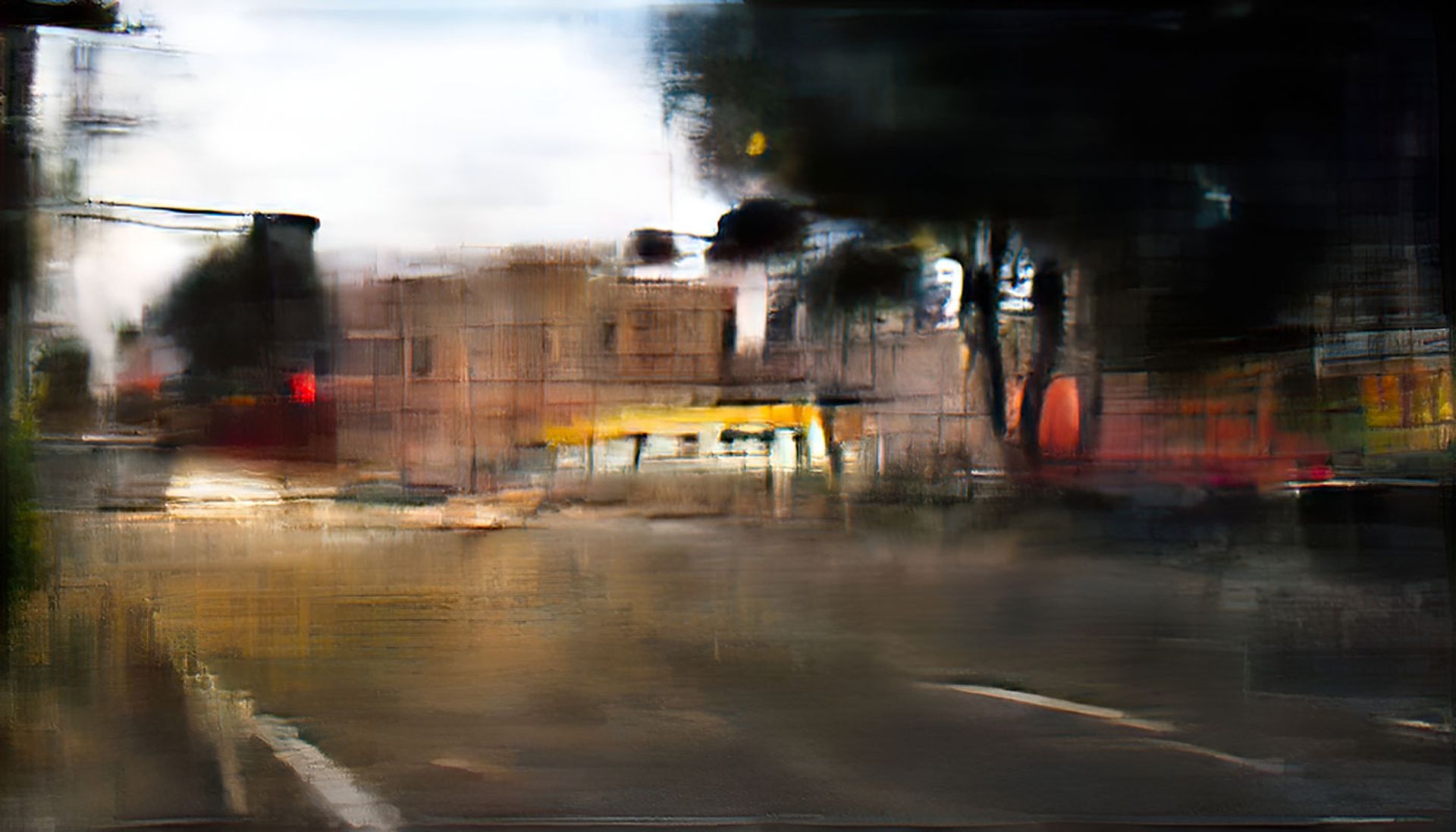
Copyright: the artist. Courtesy of Lumen Prize
Still Image Award: for innovative two-dimensional digital art and imagery
Diego Trujillo Pisanty: Blind Camera
The Mexico City-born artist Diego Trujillo Pisanty—who works with information as both a concept and a material and has three times won a Young Creators fellowship from the Mexican government—developed the AI-powered Blind Camera, a point-and-record device that creates images from sound instead of light. The resulting "photo" represents the surrounding soundscape rather than the visual scene.
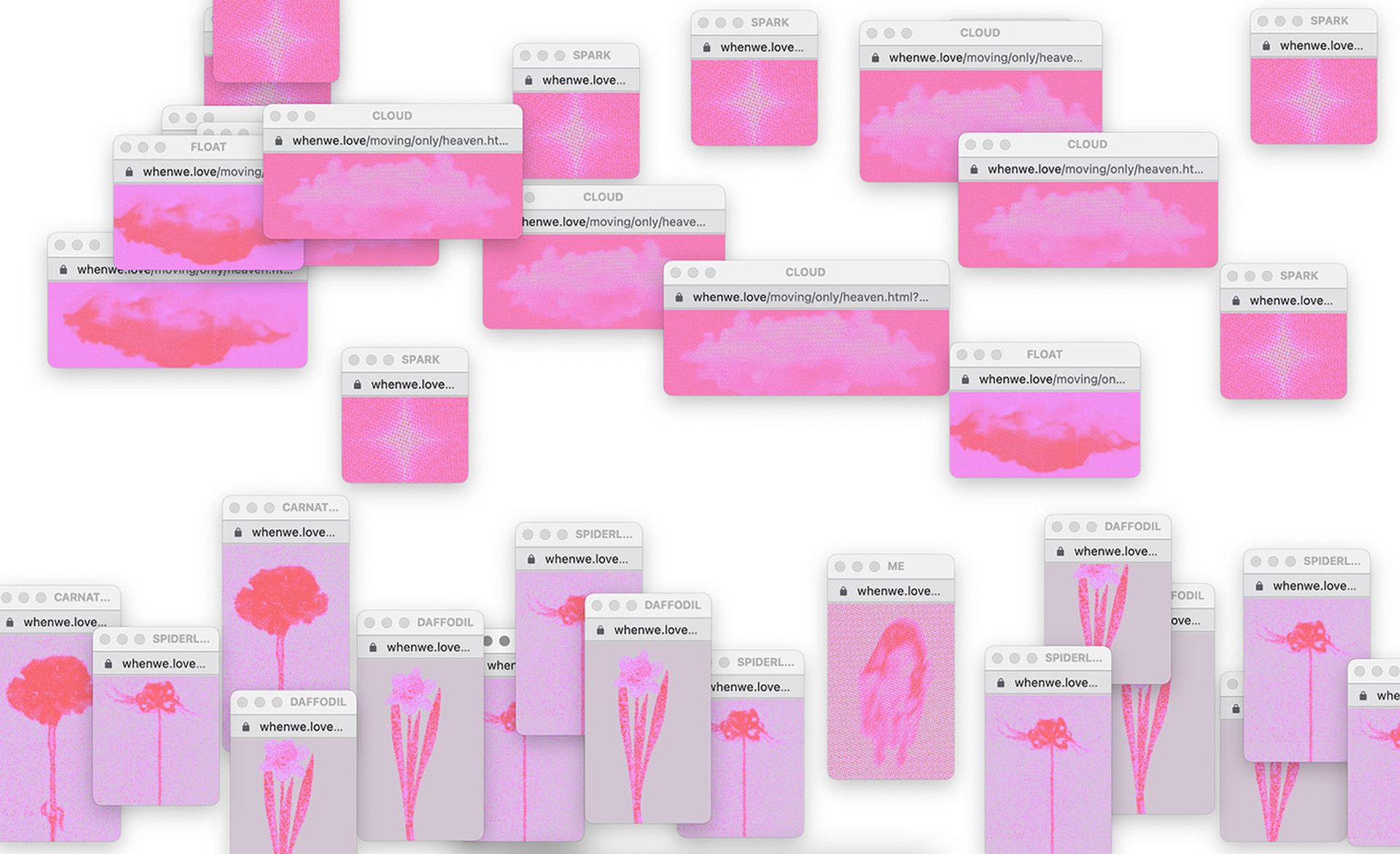
Copyright: the artist. Courtesy of Lumen Prize
Moving Image Award: for groundbreaking time-based digital work
Chia Amisola: We Are Only Moving Towards Each Other
As part of her When we Love series—encounters and explorations around love and intimacy online and offline—Filipino American artist Chia Amisola produced this hypertext experience, dependent on user interaction, in one weekend. The resulting piece, assembled out of multiple browser windows that force the reader’s view beyond one tab to piece together a story, feels like a cross between a film screening, poetry reading and an ambient performance.
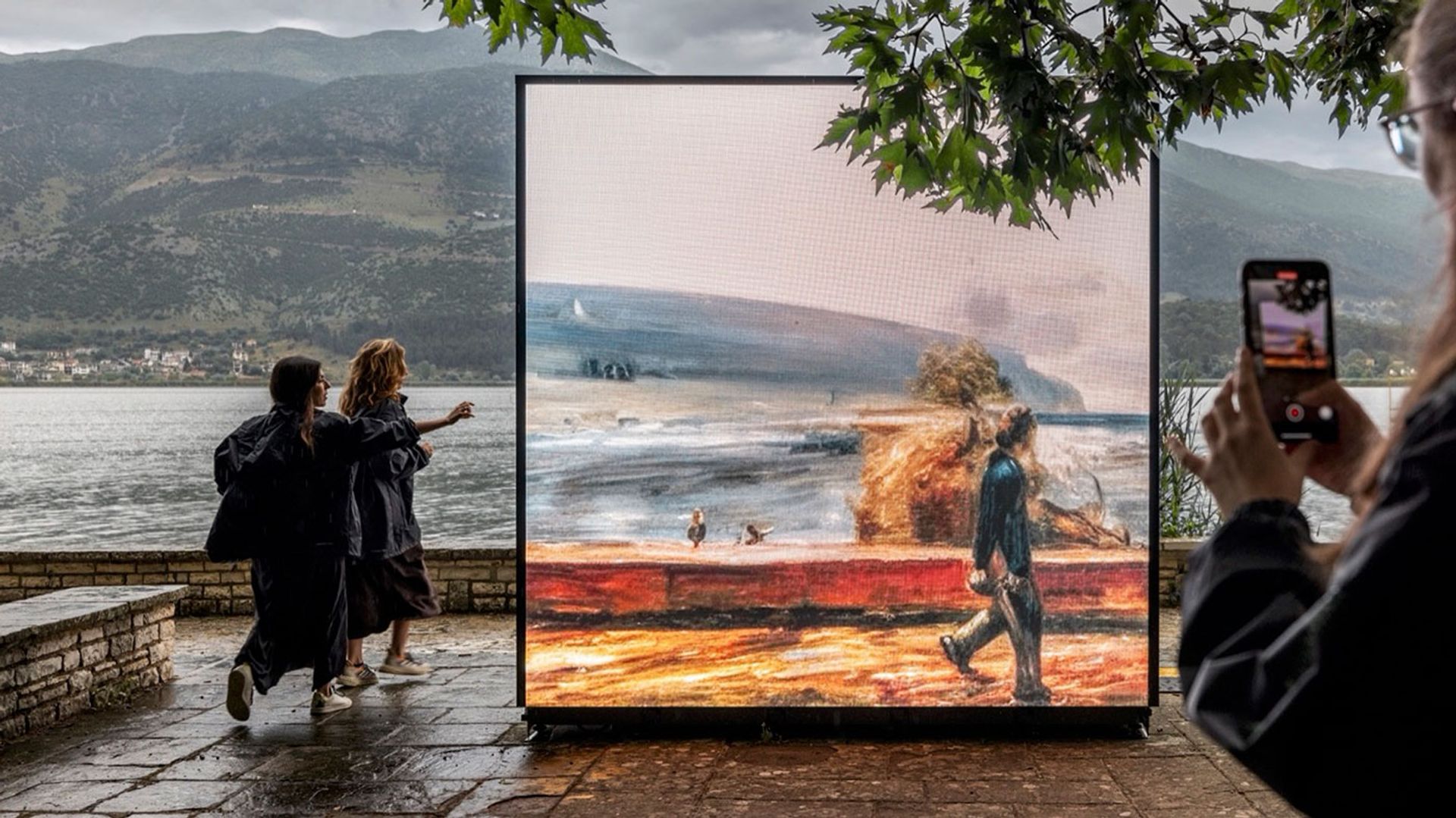
Copyright: the artists. Courtesy of Lumen Prize
Interactive Immersive: for engaging three-dimensional digital experiences
Marc Da Costa and Matthew Niederhauser: Parallels
The New York-based interdisciplinary artists Marc Da Costa and Matthew Niederhauser designed Parallels, a responsive machine-learning installation that interacts with its surroundings to transform a square LED wall into a portal for visitors to encounter the world and themselves through the lens of a neural network. A camera at the rear of the large screen captures one image per second and from that generates a visual output based on environmental data and AI models trained on the art and visual histories of the site. Parallels was commissioned through Onassis ONX for Plásmata II: Ioannina.
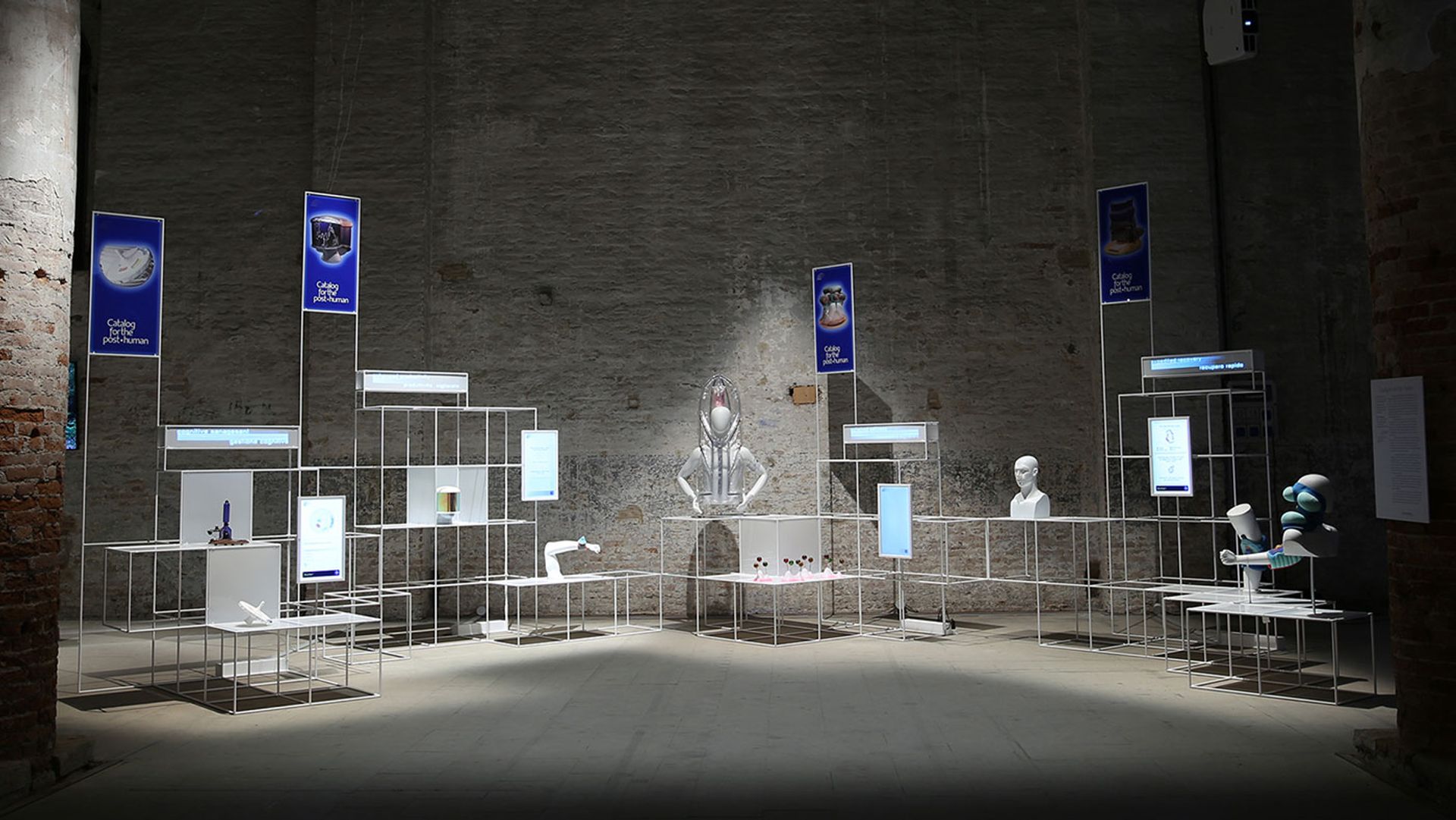
Copyright: the artists. Courtesy of Lumen Prize
Futures Award: for pioneering work exploring society-technology relationships
Parsons & Charlesworth: Catalog for the Post-Human
The design studio Parsons & Charlesworth, founded in 2014 by the Chicago-based British husband and wife team of Tim Parsons and Jessica Charlesworth, created Catalog for the Post-Human, a satirical multimedia installation, as if at a near-future technology company’s trade-fair booth, featuring fictional prototypes designed for human improvement. In their comment on workplace technologies and AI's impact on human work practices, the made-up prototypes include an inflatable jacket with built-in IV drip to remove the need for food breaks, and a set of tools for modifying the sleep cycle to align it with an economic algorithm.
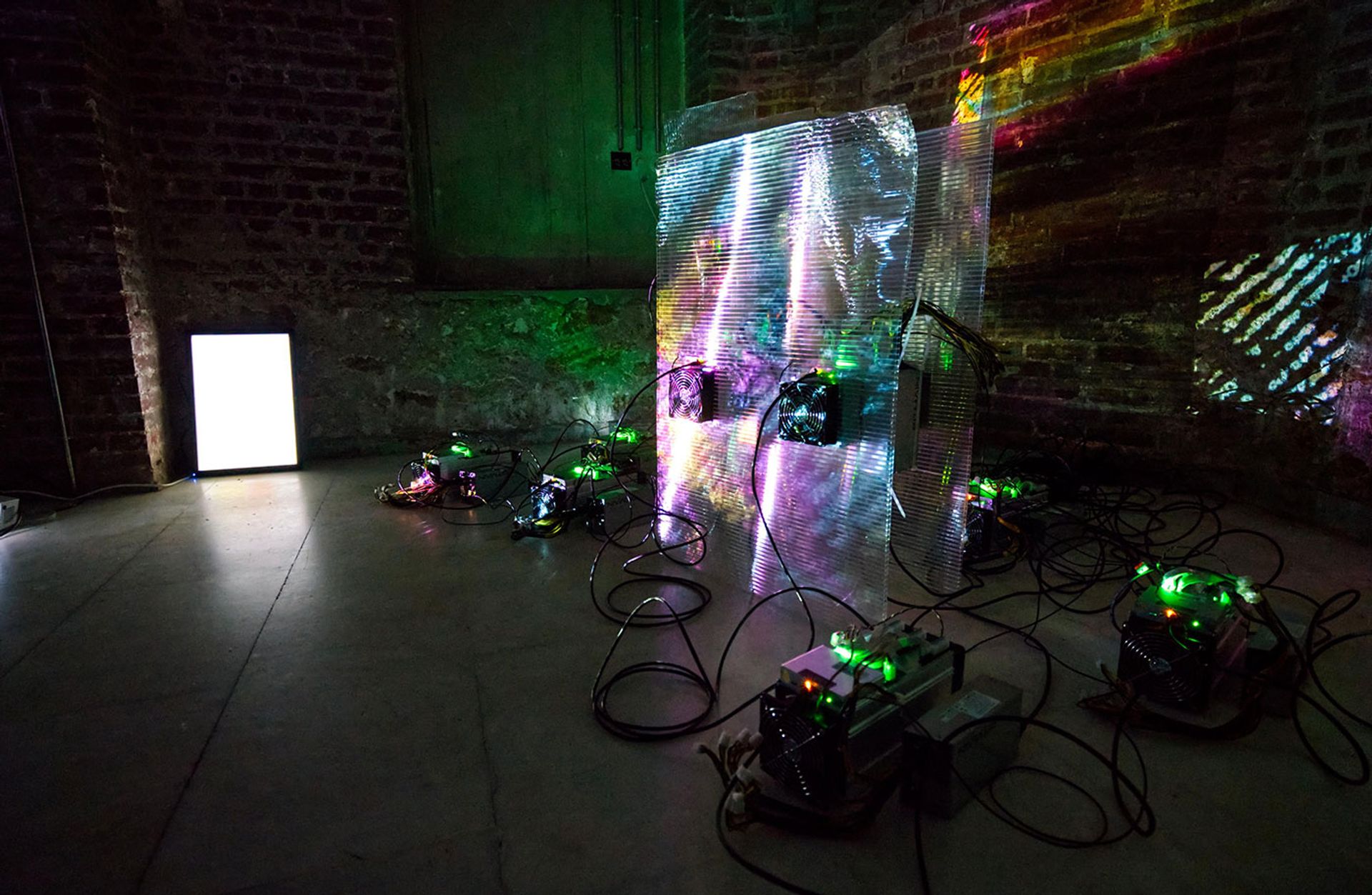
Copyright: the artist. Courtesy of Lumen Prize
Impact Award: for transformative art addressing socioeconomic and humanitarian issues
Lukas Truniger: Undergrown | drafting a hedge against existential risk exposure
The Swiss artist Lukas Truniger created Undergrown, a project repurposing obsolete crypto-mining hardware for volunteer science projects, which would otherwise have become e-waste. The installation plays symphonies of cooling fan noises—a nice pre-echo to the cooling-fan instrument at Holly Herndon and Mat Dryhurst’s exhibition, The Call, now on at Serpentine North, in London—and exploring parallels between human and plant communication networks. “It is hacked,” Truniger writes on Instagram, “to participate in scientific volunteer computing and thus contributes a tiny bit to reduce our existential planetary risks exposure.”
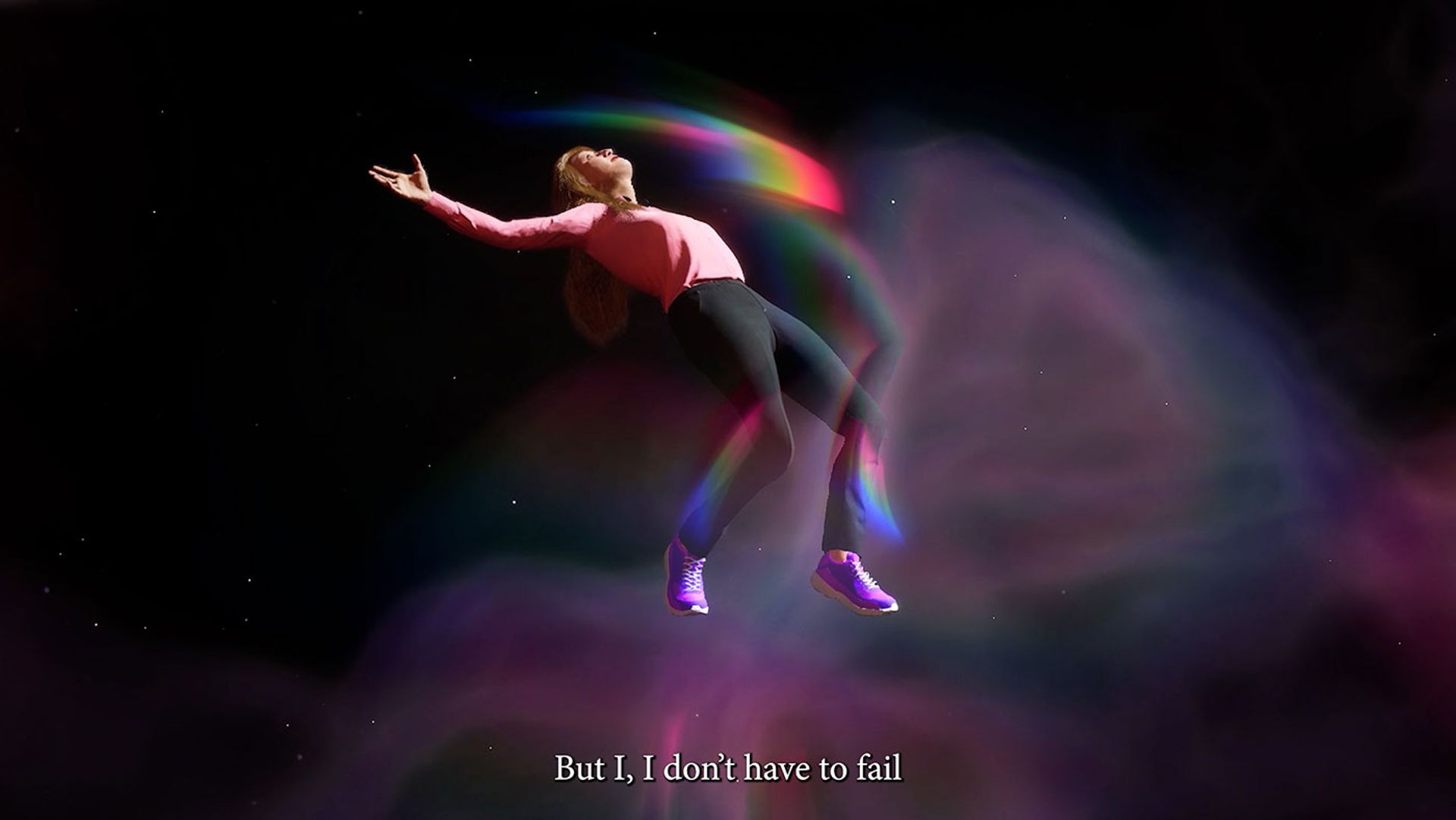
Copyright: the artist. Courtesy of Lumen Prize
Nordic Award: for outstanding art from Nordic countries
Maren Dagny Juell: Human Resource The Musical
The Norwegian artist Maren Dagny Juell composed Human Resource The Musical, a critique of corporate language, featuring an AI-generated female avatar. The mannequin is on the point of giving a musical TED-style talk about the effective use of Human Resources when she bursts into song as the lecture hall turns into an office landscape where she performs a Disney-like musical replete with office furniture and machinery.
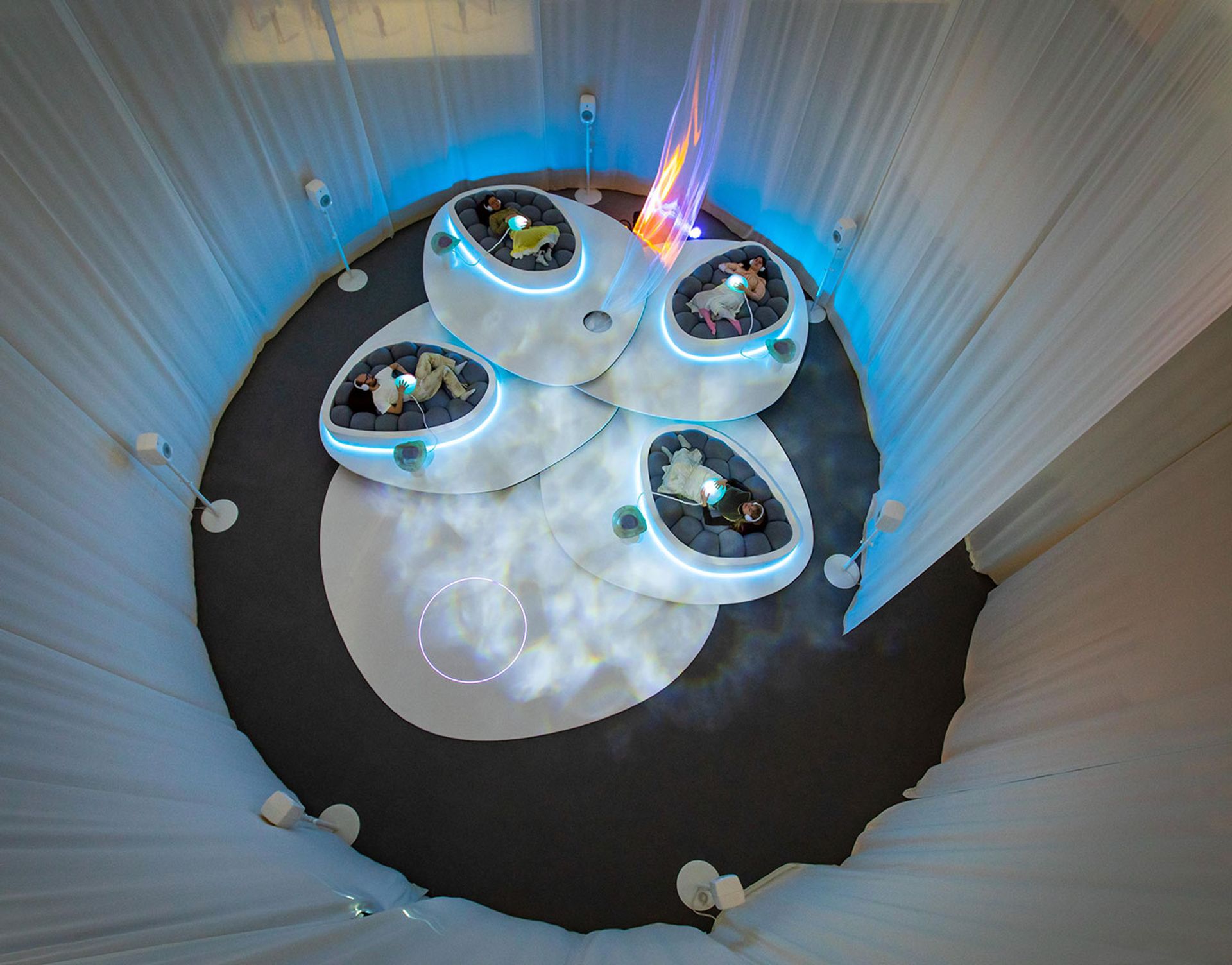
Copyright: the artists. Courtesy of Lumen Prize
British Computing Society (BCS) Award: for positive impact on technology experiences
Keiken: Spirit Systems of Soft Knowing ༊*·˚
The London- and Berlin-based artist collective Keiken—co-founded by Tanya Cruz, Hana Omori and Isabel Ramos, artists of mixed diasporic backgrounds, in 2015—created Spirit Systems of Soft Knowing ༊*·˚ as an ecosystem centered around a haptic wearable womb that connects its audience to natural sounds and vibrations to encourage reconnection with the body.
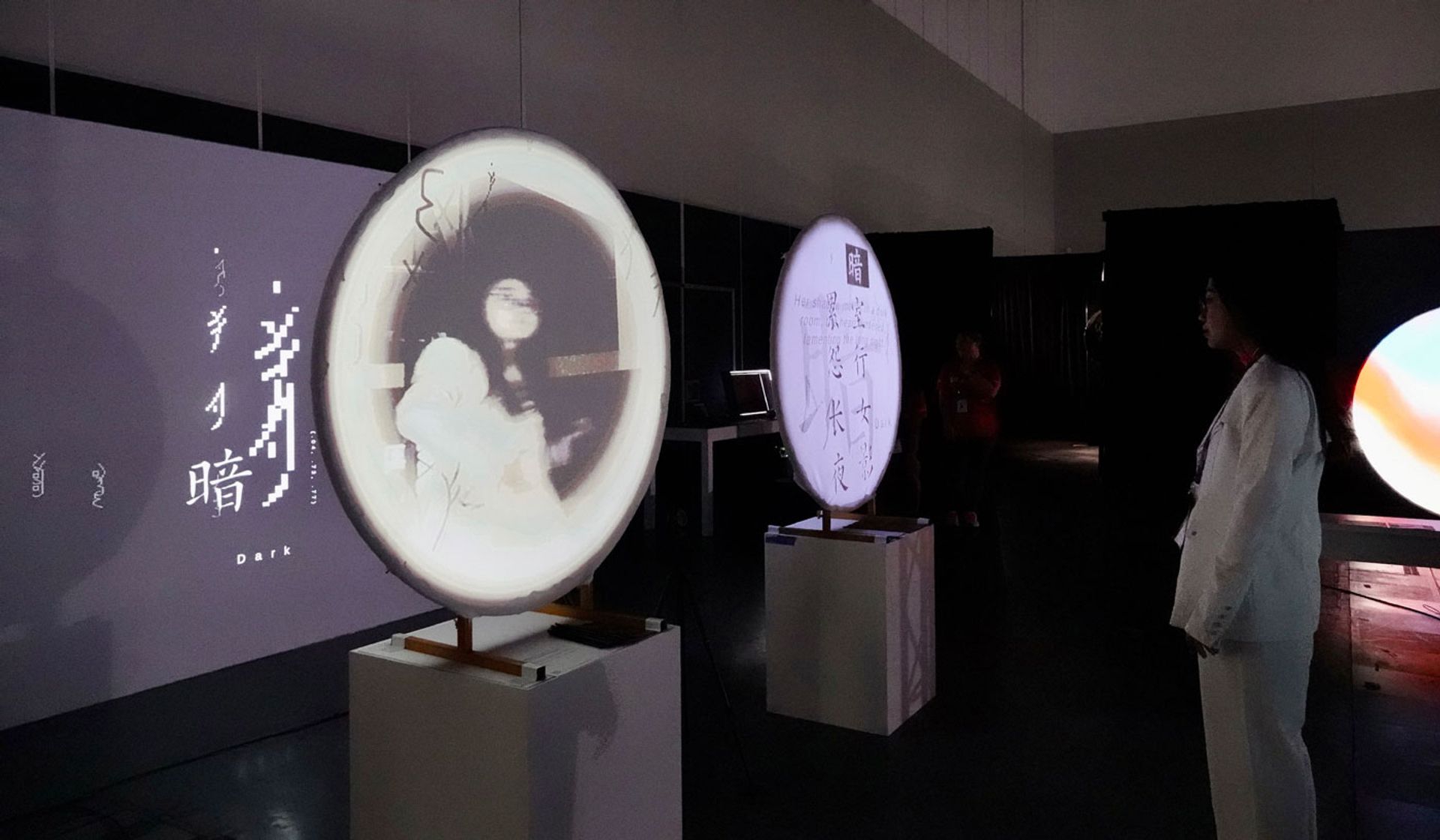
Copyright: the artist. Courtesy of Lumen Prize
Carla Rapoport Award: for exploring under-represented perspectives
UchanSun: AI Nüshu
The artist UchanSun gave the speech of the evening at the Lumen Awards describing the powerful historical background to AI Nüshu, a project that trains AI to imitate the creation of Nüshu, a script devised by women in Hunan, China, after they were forbidden to read and write traditional Chinese.
Student Award Winner, sponsored by Zora
The Reverie of Awakening team (Sara Almasoud, Xiaoya Huang, Yi Wang, Linyuan Gong, Haohan Cui, Siyu Ming): Reverie of Awakening
The dislocating experience of the pandemic lies behind the creation by the Reverie of Awakening student team of a virtual reality game designed to free players from unrevealed depression, through four game stages inspired by a butterfly's life cycle. "In Chinese tradition", the team says, "each stage represents the journey of being ensnared by depression, overcoming negative emotions, and ultimately embracing the freedom of a positive mindset" after collecting the seeds of dream flowers.


